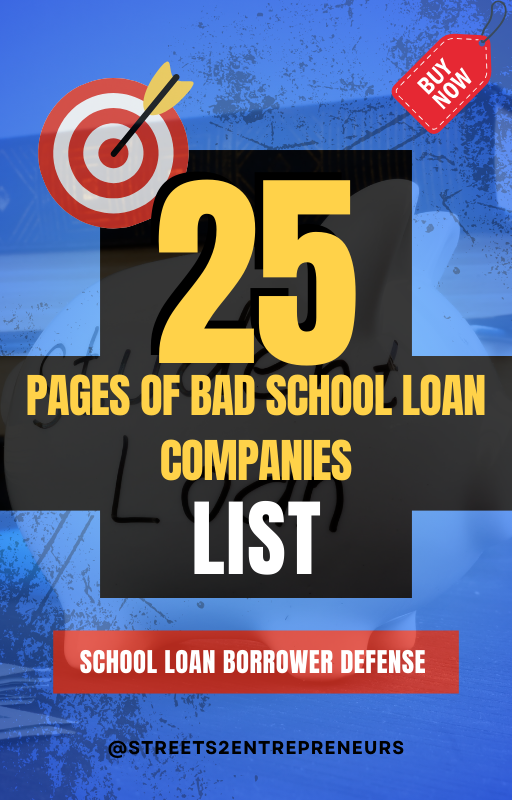🎓 They Lied, You Pay: The Hidden Truth About School Loans & Your Legal Rights
Use Consumer Law to Cancel Debt, Sue Schools & Get Refunds — Before It’s Too Late
Recent investigations have brought to light significant issues within the student loan servicing industry, particularly involving the Missouri Higher Education Loan Authority (MOHELA). Allegations include overcharging borrowers, failing to process paperwork in a timely manner, and providing misleading information about loan accounts.
Being a consultant for credit repair, school loans and the new Trump administration is causing millions of Americans issues because of school loan debt.
With 42.7 million student loan borrowers owing $1.64 trillion in 2024, student loans are a significant financial burden for many Americans. Beyond the challenge of managing repayments, borrowers face growing concerns about privacy breaches and loan servicing issues. In early 2025, reports surfaced that the Department of Government Efficiency (DOGE), led by Elon Musk, accessed sensitive student loan data, sparking lawsuits and public outcry.
Meanwhile, servicers like MOHELA have drawn criticism for systemic failures, such as billing errors and poor customer service. Misinformation, particularly on platforms like TikTok, has fueled false hopes that filing privacy complaints can cancel loans. This article clarifies your rights under privacy laws like FERPA, addresses common servicing problems, and provides actionable steps to protect yourself, drawing on recent reports and legal insights.
🔍Understanding FERPA and Your Privacy Rights
The Family Educational Rights and Privacy Act (FERPA), enacted in 1974, protects the privacy of student education records. Under [20 U.S.C. § 1232g], FERPA grants students the right to:
- Inspect and review their education records.
- Request corrections to inaccurate or misleading records.
- Control the disclosure of personally identifiable information (PII), such as transcripts, enrollment status, or financial aid data, except in specific circumstances (e.g., to school officials with a legitimate educational interest).
Recent attention has focused on alleged FERPA violations involving DOGE’s access to student loan data, including Social Security numbers and contact information. A lawsuit filed by the University of California Student Association in February 2025 alleges that the U.S. Department of Education unlawfully shared data with DOGE, violating borrowers’ privacy rights. While these concerns are valid, legal experts emphasize that FERPA violations do not provide a basis for loan cancellation. A 2002 Supreme Court ruling clarified that students cannot sue under FERPA, limiting remedies to administrative actions like improved data security.
Social media platforms, particularly TikTok, have spread misleading claims that filing a FERPA complaint can lead to loan forgiveness. For example, a viral video viewed over 2.4 million times falsely suggested that DOGE’s actions could result in debt discharge. Fact-checkers, including PBS and Forbes, have debunked these claims, noting that no law, including FERPA, erases debt due to privacy breaches. Instead, FERPA complaints can prompt investigations to ensure better data protection but do not affect loan balances.
What You Can Do About Privacy Concerns
If you suspect a privacy breach:
- File a FERPA Complaint: Submit a complaint to the U.S. Department of Education’s Student Privacy Policy Office via [Student Privacy]or by mail. This can address unauthorized access but won’t cancel your loans.
- Monitor Your Accounts: Contact your loan servicer to verify that no unauthorized actions have been taken on your account.
- Place Fraud Alerts: Request fraud alerts with Equifax, Experian, and TransUnion to protect against identity theft.
- Stay Informed: Follow updates on legal actions, such as the lawsuit against DOGE, through trusted sources like the Department of Education or reputable news outlets.
Potential risks from breaches include identity theft, tax fraud, and administrative errors due to staffing shortages at the Department of Education. Borrowers with undocumented status listed on financial aid forms may also face immigration-related risks, as noted by [Debt.org].

Common Student Loan Servicing Issues
Beyond privacy concerns, borrowers frequently encounter issues with loan servicers. A 2024 CFPB report documented 18,000 complaints about:
- Payment Processing Errors: Payments not applied correctly, leading to unwarranted fees or delinquencies.
- Inaccurate Billing Statements: Errors in loan balances or repayment terms.
- Delays in Income-Driven Repayment Applications: Hindering access to lower payments or forgiveness programs like Public Service Loan Forgiveness (PSLF).
- Unhelpful Customer Service: Long wait times, unanswered queries, or redirection to ineffective online portals.
Servicers like MOHELA and Navient have faced significant scrutiny. In 2024, MOHELA was the top recipient of complaints about federal student loans, with issues like failing to send billing statements to 2.5 million borrowers, resulting in 800,000 missed payments. The AFT v. MOHELA lawsuit, filed in July 2024, alleges systemic misconduct, including unauthorized payment drafts and call-deflection schemes. These issues can cause financial distress and credit damage, making it critical for borrowers to act swiftly.
Steps to Address Servicing Issues
If you encounter servicing problems:
- Contact Your Servicer: Document all communications and request corrections for errors like incorrect billing or payment misapplication.
- File a Complaint with the CFPB: Use the [CFPB Complaint Portal]to report unresolved issues. The CFPB oversees servicers and can investigate complaints.
- Seek Assistance from Federal Student Aid: Contact the Federal Student Aid Information Center via [Federal Student Aid]for guidance on repayment options or disputes.
- Monitor Your Credit: Check your credit reports for errors caused by servicing mistakes and dispute inaccuracies with credit bureaus.
Borrowers with MOHELA or Navient should be particularly vigilant, given their high complaint volumes, as reported by [Investopedia].
Avoiding Student Loan Scams
The complexity of student loans makes borrowers prime targets for scams. Scammers often promise quick forgiveness or consolidation but deliver nothing. According to the U.S. Department of Education, key signs of a scam include:
- Unsolicited Offers: Legitimate entities like the Department of Education or servicers do not contact you unexpectedly with forgiveness offers.
- Requests for Sensitive Information: Never share your StudentAid.gov username or password. Official communications come from specific email addresses (e.g., @ed.gov) .
- Poor Grammar or Unofficial Branding: Emails with typos, unusual capitalization, or non-official logos are red flags.
If you suspect a scam:
- Contact Your Servicer: Verify any actions taken on your account and revoke unauthorized access.
- Change Passwords: Update your StudentAid.gov password immediately if you’ve shared it.
- Report to Authorities: File complaints with the FTC or CFPB to track and prevent further scams.
In 2023, the Department of Education warned about scammers exploiting borrowers’ frustrations, a trend that continues in 2025 with the rise of misinformation about FERPA and loan cancellation.
Taking Action: Filing Complaints and Seeking Help
To protect your rights and address issues:
- For Privacy Breaches:
- File a FERPA complaint with the Department of Education to address unauthorized data access via Student Privacy.
- Place fraud alerts with Equifax, Experian, and TransUnion to safeguard your credit.
For Servicing Issues:
- Start with your servicer, then escalate to the CFPB or Federal Student Aid if needed.
- Document all interactions to support your case.
For Suspected Scams:
- Report to the FTC or CFPB and update your account security.
- Avoid engaging with suspicious offers or sharing personal information.
Navigating these issues can be complex, but professional assistance is available. At ConsumerAI, we leverage AI-driven tools to help borrowers resolve disputes related to privacy breaches and servicing errors. Book a free consultation at ConsumerAI Consultation, explore our resources at ConsumerAI Website, or join our community for support at ConsumerAI Community. Follow us on X (@disputeai_ai) for the latest updates on consumer rights.
Conclusion
Student loan borrowers face significant challenges, from privacy breaches to servicing errors and scams. While FERPA protects your educational records, it does not offer loan forgiveness, despite misleading claims. Servicing issues, like those reported with MOHELA, require proactive steps, such as contacting your servicer or filing complaints with the CFPB. By staying informed, recognizing scams, and utilizing resources like ConsumerAI, you can protect your rights and manage your loans effectively. Don’t hesitate to seek expert help to navigate this complex landscape.

📘 Learn More and Get Support
For comprehensive guidance and support, visit ConsumerAI.info. Here, you can access resources, book consultations, and stay informed about your rights and the latest developments in student loan servicing.
Note: This article was crafted by Daniel Wray, an expert in consumer rights and AI-driven dispute resolution. For further assistance, visit:

.jpg)

Comments
Post a Comment